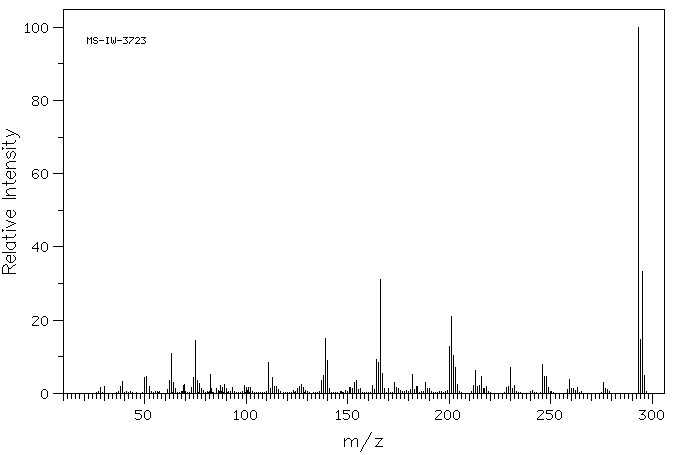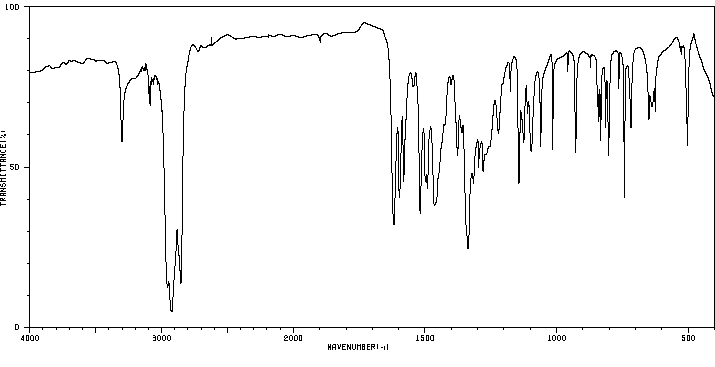2,4-dinitro-4'-chloro diphenylamine | 1226-23-9
中文名称
——
中文别名
——
英文名称
2,4-dinitro-4'-chloro diphenylamine
英文别名
4'-chloro-2,4-dinitrodiphenylamine;(4-chloro-phenyl)-(2,4-dinitro-phenyl)-amine;(4-Chlor-phenyl)-(2,4-dinitro-phenyl)-amin;4'-Chlor-2.4-dinitro-diphenylamin;4-Chlorphenyl-2,4-dinitrophenylamin;Chloro-4'-dinitro-2.4-diphenylamin;N-(4-Chlorophenyl)-2,4-dinitroaniline
CAS
1226-23-9
化学式
C12H8ClN3O4
mdl
——
分子量
293.666
InChiKey
VHZNNEILGNYNNG-UHFFFAOYSA-N
BEILSTEIN
——
EINECS
——
-
物化性质
-
计算性质
-
ADMET
-
安全信息
-
SDS
-
制备方法与用途
-
上下游信息
-
文献信息
-
表征谱图
-
同类化合物
-
相关功能分类
-
相关结构分类
物化性质
-
熔点:166 °C(Solv: chloroform (67-66-3); ligroine (8032-32-4))
-
沸点:435.1±45.0 °C(Predicted)
-
密度:1.536±0.06 g/cm3(Predicted)
计算性质
-
辛醇/水分配系数(LogP):4.4
-
重原子数:20
-
可旋转键数:2
-
环数:2.0
-
sp3杂化的碳原子比例:0.0
-
拓扑面积:104
-
氢给体数:1
-
氢受体数:5
安全信息
-
海关编码:2921440000
上下游信息
-
上游原料
中文名称 英文名称 CAS号 化学式 分子量 2-硝基-4-氯二苯基胺 N-(4-chlorophenyl)-2-nitroaniline 23008-56-2 C12H9ClN2O2 248.669
反应信息
-
作为反应物:描述:2,4-dinitro-4'-chloro diphenylamine 在 硝酸 作用下, 生成 (4-chloro-2,6-dinitro-phenyl)-(2,4-dinitro-phenyl)-amine参考文献:名称:Coker et al., Journal of the Chemical Society, 1951, p. 110,114摘要:DOI:
-
作为产物:描述:参考文献:名称:906. 1:9–9':1'-二咔唑的合成及相关实验摘要:DOI:10.1039/jr9580004492
文献信息
-
Deep eutectic solvent as an operative media on structure‐reactivity relationships作者:Ali Reza Harifi‐Mood、Hasan KhorshahiDOI:10.1002/kin.21273日期:2019.7Deep eutectic solvents seem to be environmentally friendly solvents, particularly because they are prepared easily and have very low‐vapor pressures under ambient conditions. They are suitable candidates as green solvents for reaction media with special properties. To present this behavior, substitution reactions of some para‐ and meta‐substituted anilines with 1‐fluoro‐2,4‐dinitrobenzene have been深共晶溶剂似乎是环境友好的溶剂,尤其是因为它们易于制备且在环境条件下蒸气压非常低。它们适合作为具有特殊性能的反应介质的绿色溶剂。为了表现出这种行为,已经在不同摩尔分数的乙胺作为二甲基亚砜(DMSO)中的一种低共熔溶剂,通过分光光度法研究了部分对位和间位取代的苯胺与1-氟-2,4-二硝基苯的取代反应。在乙苯-DMSO混合物中,随乙苯的摩尔分数的增加,测得的反应速率系数显示出明显的变化。基于Hammett'的二阶速率系数的线性自由能关系(LFER)s取代基常数显示出在乙醇与DMSO混合物的不同摩尔分数下具有负斜率的合理线性直线。基于介质极性参数的另一项LFER研究表明,该溶剂与溶剂的氢键供体和受体能力具有良好的一致性。根据优先溶剂化模型进行的非LFER分析证实了溶质分子的微球溶剂化与溶剂整体组成之间的差异。
-
“Zero VOC” Synthetic Strategy - Aromatic Amination Reactions in Deep Eutectic Solvents作者:Arun Valvi、Shraeddha TiwariDOI:10.1002/ejoc.201800785日期:2018.9.23Nucleophilic aromatic substitution reactions of 2,4‐dinitrohalobenzene with secondary amines were carried out in deep eutectic solvents (DES) to give excellent yields. The reaction workup involved the addition of water for separating the product, which indicates that DES is an entirely benign reaction medium for the SNAr reactions. More importantly, the DES exhibited excellent recyclability.2,4-二硝基卤代苯与仲胺的亲核芳族取代反应在深共熔溶剂(DES)中进行,从而获得了优异的收率。反应后处理涉及添加水以分离产物,这表明DES是用于SNAr反应的完全良性的反应介质。更重要的是,DES表现出出色的可回收性。
-
Reaction kinetics investigation of 1-fluoro-2,4-dinitrobenzene with substituted anilines in ethyl acetate-methanol mixtures using linear and nonlinear free energy relationships作者:Javad Jamali-Paghaleh、Ali Reza Harifi-Mood、Mohammad Reza GholamiDOI:10.1002/poc.1861日期:2011.11measured rate coefficients of the reaction demonstrated a dramatic variation in ethyl acetate–methanol mixtures with the increasing mole fraction of ethyl acetate. Linear free energy relationship (LFER) investigations confirm that polarity has a major effect on the reaction rate whereas the hydrogen‐bonding ability of the media has a slight effect on it. Nonlinear free energy relationship based on在室温下,在乙酸乙酯和甲醇的混合物中动力学研究了1-氟-2,4-二硝基苯与对位取代和间位取代的苯胺的芳香亲核取代反应。二阶速率系数与Hammett取代基常数的相关性在乙酸乙酯-甲醇混合物的不同摩尔分数中产生了具有负斜率的相当线性的直线。测得的反应速率系数表明,随着乙酸乙酯摩尔分数的增加,乙酸乙酯-甲醇混合物会发生巨大变化。线性自由能关系(LFER)研究证实,极性对反应速率有重要影响,而介质的氢键结合能力对其影响较小。基于优先溶剂化假设的非线性自由能关系显示溶质的微球溶剂化与溶剂的整体组成之间存在差异,并且速率系数的趋势中观察到非理想行为,这涵盖了LFER结果。版权所有©2011 John Wiley&Sons,Ltd.
-
Liberation, Feminism, and Development Communication作者:H. Leslie SteevesDOI:10.1111/j.1468-2885.2001.tb00250.x日期:2001.11This essay notes the relative neglect of considerations of both liberation and gender in the scholarship and practice of development communication. Liberation perspectives on development, grounded in religion and spirituality, argue for individual and collective empowerment, and therefore appear to offer consistency with feminist thought. In practice, it is unclear to what extent women are included or empowered in applications of liberation theology to development communication. This paper argues that the theory and practice of development communication would be strengthened by drawing on insights from both feminism and liberation theology.本文指出在发展传播的学术和实践中相对忽视了对解放和性别的考虑。以宗教和灵性为基础的解放发展观主张个人和集体赋权,因此似乎与女权主义思想保持一致。在实践中,尚不清楚妇女在多大程度上被纳入或赋权于解放神学在发展传播中的应用。本文认为,通过借鉴女权主义和解放神学的见解,发展传播的理论和实践将得到加强。
-
Blom, Helvetica Chimica Acta, 1921, vol. 4, p. 1038作者:BlomDOI:——日期:——
表征谱图
-
氢谱1HNMR
-
质谱MS
-
碳谱13CNMR
-
红外IR
-
拉曼Raman
-
峰位数据
-
峰位匹配
-
表征信息
同类化合物
(βS)-β-氨基-4-(4-羟基苯氧基)-3,5-二碘苯甲丙醇
(S,S)-邻甲苯基-DIPAMP
(S)-(-)-7'-〔4(S)-(苄基)恶唑-2-基]-7-二(3,5-二-叔丁基苯基)膦基-2,2',3,3'-四氢-1,1-螺二氢茚
(S)-盐酸沙丁胺醇
(S)-3-(叔丁基)-4-(2,6-二甲氧基苯基)-2,3-二氢苯并[d][1,3]氧磷杂环戊二烯
(S)-2,2'-双[双(3,5-三氟甲基苯基)膦基]-4,4',6,6'-四甲氧基联苯
(S)-1-[3,5-双(三氟甲基)苯基]-3-[1-(二甲基氨基)-3-甲基丁烷-2-基]硫脲
(R)富马酸托特罗定
(R)-(-)-盐酸尼古地平
(R)-(-)-4,12-双(二苯基膦基)[2.2]对环芳烷(1,5环辛二烯)铑(I)四氟硼酸盐
(R)-(+)-7-双(3,5-二叔丁基苯基)膦基7''-[((6-甲基吡啶-2-基甲基)氨基]-2,2'',3,3''-四氢-1,1''-螺双茚满
(R)-(+)-7-双(3,5-二叔丁基苯基)膦基7''-[(4-叔丁基吡啶-2-基甲基)氨基]-2,2'',3,3''-四氢-1,1''-螺双茚满
(R)-(+)-7-双(3,5-二叔丁基苯基)膦基7''-[(3-甲基吡啶-2-基甲基)氨基]-2,2'',3,3''-四氢-1,1''-螺双茚满
(R)-(+)-4,7-双(3,5-二-叔丁基苯基)膦基-7“-[(吡啶-2-基甲基)氨基]-2,2”,3,3'-四氢1,1'-螺二茚满
(R)-3-(叔丁基)-4-(2,6-二苯氧基苯基)-2,3-二氢苯并[d][1,3]氧杂磷杂环戊烯
(R)-2-[((二苯基膦基)甲基]吡咯烷
(R)-1-[3,5-双(三氟甲基)苯基]-3-[1-(二甲基氨基)-3-甲基丁烷-2-基]硫脲
(N-(4-甲氧基苯基)-N-甲基-3-(1-哌啶基)丙-2-烯酰胺)
(5-溴-2-羟基苯基)-4-氯苯甲酮
(5-溴-2-氯苯基)(4-羟基苯基)甲酮
(5-氧代-3-苯基-2,5-二氢-1,2,3,4-oxatriazol-3-鎓)
(4S,5R)-4-甲基-5-苯基-1,2,3-氧代噻唑烷-2,2-二氧化物-3-羧酸叔丁酯
(4S,4''S)-2,2''-亚环戊基双[4,5-二氢-4-(苯甲基)恶唑]
(4-溴苯基)-[2-氟-4-[6-[甲基(丙-2-烯基)氨基]己氧基]苯基]甲酮
(4-丁氧基苯甲基)三苯基溴化磷
(3aR,8aR)-(-)-4,4,8,8-四(3,5-二甲基苯基)四氢-2,2-二甲基-6-苯基-1,3-二氧戊环[4,5-e]二恶唑磷
(3aR,6aS)-5-氧代六氢环戊基[c]吡咯-2(1H)-羧酸酯
(2Z)-3-[[(4-氯苯基)氨基]-2-氰基丙烯酸乙酯
(2S,3S,5S)-5-(叔丁氧基甲酰氨基)-2-(N-5-噻唑基-甲氧羰基)氨基-1,6-二苯基-3-羟基己烷
(2S,2''S,3S,3''S)-3,3''-二叔丁基-4,4''-双(2,6-二甲氧基苯基)-2,2'',3,3''-四氢-2,2''-联苯并[d][1,3]氧杂磷杂戊环
(2S)-(-)-2-{[[[[3,5-双(氟代甲基)苯基]氨基]硫代甲基]氨基}-N-(二苯基甲基)-N,3,3-三甲基丁酰胺
(2S)-2-[[[[[((1S,2S)-2-氨基环己基]氨基]硫代甲基]氨基]-N-(二苯甲基)-N,3,3-三甲基丁酰胺
(2S)-2-[[[[[[((1R,2R)-2-氨基环己基]氨基]硫代甲基]氨基]-N-(二苯甲基)-N,3,3-三甲基丁酰胺
(2-硝基苯基)磷酸三酰胺
(2,6-二氯苯基)乙酰氯
(2,3-二甲氧基-5-甲基苯基)硼酸
(1S,2S,3S,5S)-5-叠氮基-3-(苯基甲氧基)-2-[(苯基甲氧基)甲基]环戊醇
(1S,2S,3R,5R)-2-(苄氧基)甲基-6-氧杂双环[3.1.0]己-3-醇
(1-(4-氟苯基)环丙基)甲胺盐酸盐
(1-(3-溴苯基)环丁基)甲胺盐酸盐
(1-(2-氯苯基)环丁基)甲胺盐酸盐
(1-(2-氟苯基)环丙基)甲胺盐酸盐
(1-(2,6-二氟苯基)环丙基)甲胺盐酸盐
(-)-去甲基西布曲明
龙蒿油
龙胆酸钠
龙胆酸叔丁酯
龙胆酸
龙胆紫-d6
龙胆紫









